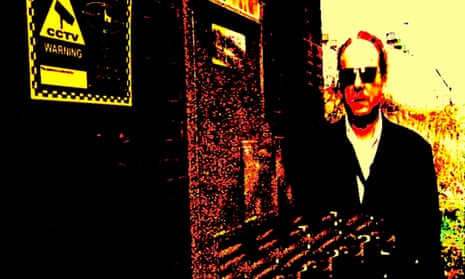Between 1974 and 1994, Cabaret Voltaire made a career out of being slightly ahead of the curve. They may well have been the world’s first industrial band. Throbbing Gristle coined the genre’s name, but more than a year before they formed, Cabaret Voltaire were ensconced in a Sheffield attic, experimenting with tape cut-ups inspired by William Burroughs, looped recordings of machinery in place of rhythms and churning electronic noise. When their sound shifted in the early 80s to something more commercially palatable, involving funk, the influence of New York electro and, eventually, collaborations with Chicago house pioneer Marshall Jefferson, it presaged their home town’s unique take on dance music, which eventually produced revered techno label Warp.

Conversely, the first Cabaret Voltaire album in 24 years feels oddly of the moment. The song titles reveal a band who never met a paranoid dystopian fantasy they didn’t like: Silent Command, Spread the Virus, Kneel to the Boss, The Crackdown. They – or rather Richard H Kirk, the sole remaining member – find themselves returning in an era that seems, well, very Cabaret Voltaire. Their old luridly grim presentiments about information and disinformation overload, curfews and crackdowns, surveillance and political chaos appear to have been fulfilled. At points, however, current events overshadow the contents of Shadow of Fear. Microscopic Flesh Fragment ends with a sample of a voice gloomily intoning the phrase “thousands will die” – precisely the kind of thing Cabaret Voltaire would have once have used to conjure up a scenario of unimaginable horror. Today, you hear it and think: yeah, that’s a conservative estimate.
Timely or not, the existence of Shadow of Fear raises some questions. How does one member make a Cabaret Voltaire album that’s identifiably Cabaret Voltaire – rather than a solo album that uses the band’s name as a flag of convenience – without recourse to the past? It’s a conundrum that Kirk answers quite neatly. The sound of Shadows of Fear is definitely haunted by the band’s back catalogue. The beats frequently recall the primitive drum machine that powered their 1979 debut Mix-Up; the dense, claustrophobic sound, heavy on spoken-word samples, has a distinct ring of their early 80s work about it. And it’s all thematically in keeping with the Cabaret Voltaire worldview: to the list of twitchy song titles above, you can now add The Power (of Their Knowledge), Be Free, Night of the Jackal and What’s Goin’ On, which slyly re-appropriates Marvin Gaye’s question and lends it a more desperate, pleading tone.
But it never sounds like pastiche. Some of the freshness is circumstantial: the vocals are absent, along with Kirk’s former collaborator Stephen Mallinder, the band’s default singer; technological advances mean the grimy sonic quality of old Cabaret Voltaire has gone too. Equally, Kirk is intent on pushing forward, ensuring that the hints of familiarity never come with an accompanying tang of comforting nostalgia. The music on Shadow of Fear is frequently so forceful and alive that it precludes the sensation that plagues a lot of new music by rebooted “classic” artists: you never feel like you’d be better off listening to one of their old albums.
Instead, you feel actively unsettled. Universal Energy has a four-to-the-floor house beat and something approaching an acid synth line, but the whole thing feels out of whack: the beats judder very slightly, the sounds clash, muffled voices chatter in the distance, the overall effect a kind of danceable panic. What’s Goin’ On stirs in samples of Blaxploitation horns and a sound that recalls a funky wah-pedal guitar, but everything is distorted and underpinned by a relentless, machine-like beat, until it feels harsh and unremitting. The Power (of Their Knowledge) is less wilfully cluttered with sound, but no less discomfiting: underneath synths shrouded in dubby echo, it features sprawling, fuzzed-out guitar and a layer of white noise that fades in and out, both low in the mix, like something you’re overhearing rather than listening to.
Shadow of Fear makes few concessions to user-friendliness – it’s far heavier-going than the last albums the original Cabaret Voltaire made – and for every listener who finds it a powerful, cathartic reflection of the times, there’s bound to be one who feels it’s the last thing they want to hear at the moment, life being what it is. Then again, Cabaret Voltaire were always divisive: this is, after all, a band whose first public appearance ended in a brawl between horrified audience members, the band themselves and those who, in Kirk’s words, “took our side of the argument”. What it does, and does successfully, might be the hardest thing for a reformed band to pull off: it adds to their catalogue, rather than detracts from it.
This week Alexis listened to
The Antlers – It Is What It Is
This is beautiful: a desperately sad, if accepting and musically stirring, meditation on death that sounds like it was recorded live.

Comments (…)
Sign in or create your Guardian account to join the discussion